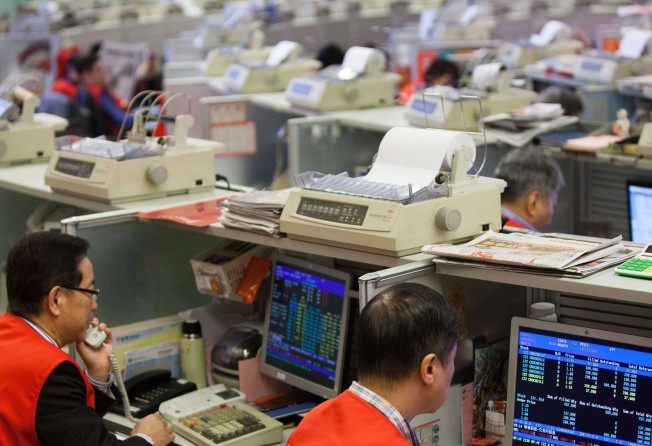Hong Kong shares advance on expectations of cross-border trading connect, Shanghai shares end little changed
Hang Seng Index tacks on 0.9 per cent, while Shanghai Composite slips 0.05 per cent

Hong Kong stocks surged on Friday afternoon on media report that a Shenzhen stock connect is around the corner, while mainland shares ended flat, chalking up the sixth weekly loss in a row—the longest in four years.
The Hang Seng Index climbed up 0.88 per cent, or 179.66 points, to 20,576.77, the highest since May 3. The Hang Seng China Enterprises index gained 0.81 per cent, or 69.09 points, to 8,595.28. Trading turnover in Hong Kong reached HK$55.52 billion.
In the mainland, the benchmark Shanghai Composite Index dropped 0.05 per cent, or 1.4 points, to 2,821.03 while the CSI 300 — which tracks the largest companies listed in Shanghai and Shenzhen — fell 0.06 per cent, or 1.71 points, to 3,062.5.
The Shenzhen Composite Index lost 0.1 per cent or 1.89 points to 1,807.04 and the Nasdaq-style ChiNext slipped 0.77 per cent, or 16.12 points, to 2,069.89.
Trading turnover in Shanghai and Shenzhen was a relatively low 378.4 billion yuan. .
Local newspaper Hong Kong Economic Times reported that the Hong Kong bourse may soon expand the quota for southbound trading under the Shanghai Hong Kong Stock Connect, given that the original quota would be filled in three and half months. It also cited an analyst as saying that Beijing next week may announce the debut of the Shenzhen stock connect on July 1.
“Investors were just speculating on the news,” Castor Pang, Core Pacific Yamaich head of research said.
The spokesperson of local exchange said it has not known the timeline to launch the Shenzhen stock connect, reiterating that it requires three to four months to prepare after regulators green light launch.
In Hong Kong market, securities stocks tilted higher, accompanied by Hong Kong Exchanges and Clearing shares, which rose 2.19 per cent to HK$182.3.
In other action, mainland banks, insurers and Hong Kong developers rose together.
Tencent Holdings shares rose 4.52 per cent to HK$171.2 to become the best performing blue chip. The closing price was a record high for the share which made its Hong Kong trading debut in 2004. AIA Group shares rose 0.79 per cent to finish at HK$44.85 and HSBC shares ended flat.
Tingyi (Cayman Islands) Holding, the beverage and instant noodle makers, became the worst-performing blue chip with shares falling 10.21 per cent to HK$7.21. Its net profit for the first quarter was down 46 per cent year on year to US$58.01 million.
Daily trading turnover of blue chips usually account for 32 per cent of the total turnover, but it climbed to 42 per cent during Friday’s session, Pang said.
“Today’s rebound was driven by securities firms and HKEX. Small and mid-sized companies did not rally together and the turnover did not rise much. The sentiment is not strong enough and investors may turn cautious before regulators confirm the news,” Jason Chan, Southwest Securities investment manager, said.
“As the A-share market lost direction and has stood flat for some time, some capital flew to the Hong Kong market,” Jason Chan, Southwest Securities investment manager, said.
“A-shares have been strange. There seems to be a hand shoring up the benchmark once it slides to 2,800. But there is no momentum to climb up,” Pang said.
The price/earnings ratio of the Shanghai Composite Index, at 12 times, is still expensive for a market where economic growth is slowing down, Pang said.
For the week, the Shanghai Composite Index lost 0.16 per cent, while the Hang Seng Index surged 3.65 per cent, its biggest weekly gain in six weeks.
Additional reporting by Naomi Ng.
An earlier version of this story stated an incorrect figure for the daily turnover of the Hong Kong stock market. The figure has been corrected.